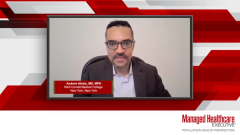
Impact of Vitiligo on Quality of Life
An expert discusses how vitiligo significantly affects patients’ psychosocial health due to its visible nature, unpredictable course, slow treatment response, and particularly severe impact on younger patients and those with darker skin tones who may experience depression and social isolation.
Episodes in this series

Video content above is prompted by the following:
Segmental and nonsegmental vitiligo exhibit distinct clinical presentations and progression patterns that significantly influence treatment approaches. Segmental vitiligo typically affects younger patients and progresses rapidly within a localized body segment before “burning out” and becoming stable, making it particularly challenging to treat effectively. Nonsegmental vitiligo develops more gradually in older patients, creating scattered or localized patches that respond much better to therapeutic interventions due to their slower progression and different underlying mechanisms.
Vitiligo profoundly affects patients’ psychosocial well-being due to its highly visible nature and unpredictable progression. The condition particularly impacts younger patients who are especially conscious of their appearance, though adults also experience significant psychological distress. The inability to easily conceal vitiligo patches with makeup or clothing creates ongoing social anxiety and self-consciousness that can persist throughout treatment.
The unpredictable nature of vitiligo, combined with extremely long treatment timelines, creates substantial patient burden and psychological stress. Repigmentation can take months or years of consistent treatment before visible improvement occurs, requiring exceptional patient commitment and realistic expectation management. The condition’s tendency to recur even after successful treatment, along with its more pronounced visibility in darker skin tones, necessitates comprehensive psychosocial support including potential psychological counseling, particularly for younger patients struggling with social integration and self-esteem issues.
Newsletter
Get the latest industry news, event updates, and more from Managed healthcare Executive.

























